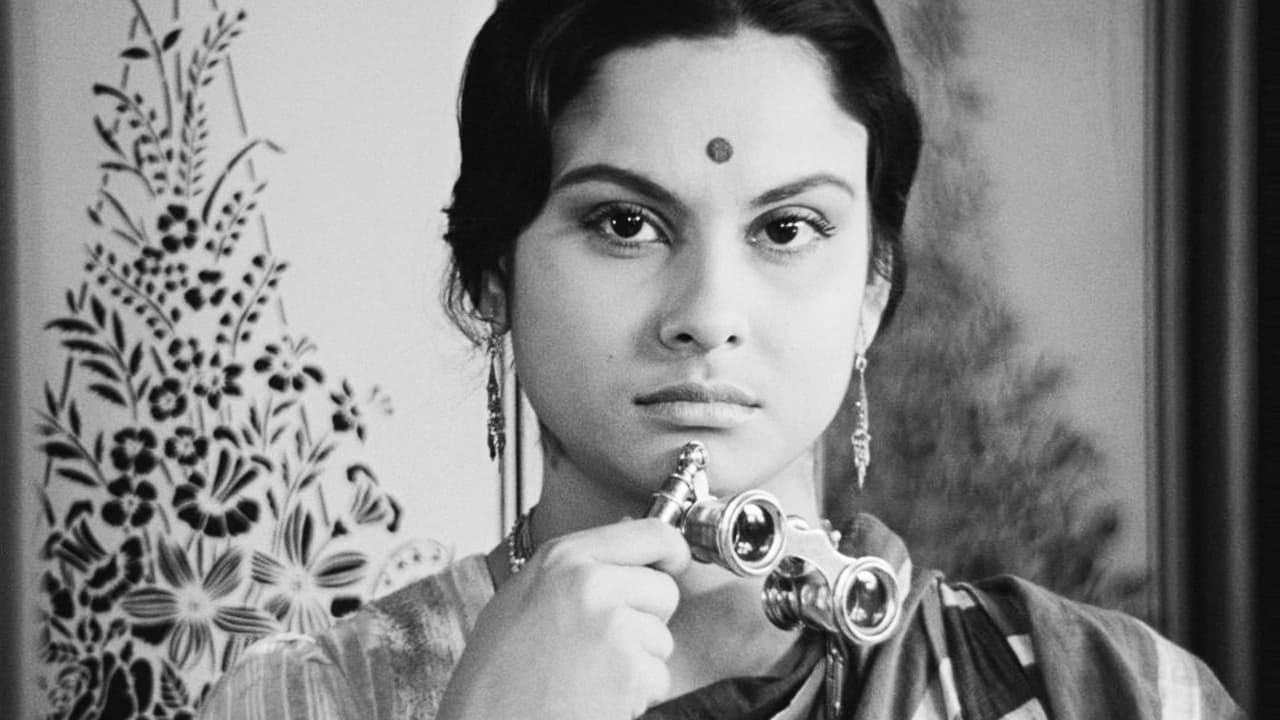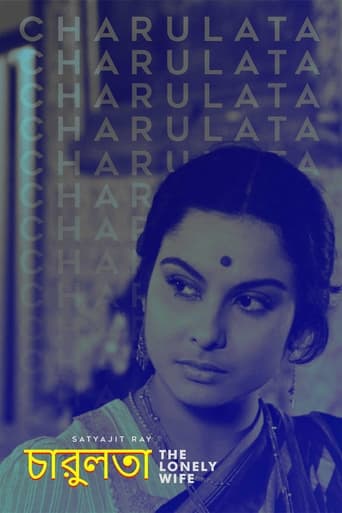Solidrariol
Am I Missing Something?
Merolliv
I really wanted to like this movie. I feel terribly cynical trashing it, and that's why I'm giving it a middling 5. Actually, I'm giving it a 5 because there were some superb performances.
Quiet Muffin
This movie tries so hard to be funny, yet it falls flat every time. Just another example of recycled ideas repackaged with women in an attempt to appeal to a certain audience.
lasttimeisaw
Also known as THE LONELY WIFE for the anglophone, adapted from Tagore's novella, CHARULATA is Satyajit Ray's sally into the Bengali upper class of the Victorian Calcutta in the 1880s, and the titular heroine is Charu (Madhabi Mukherjee, the leading actress in THE BIG CITY 1963), a young wife of Bhupati (Shailen Mukherjee), a liberal-minded intellectual who runs a politcal newspaper "the Sentinel". The plot moves in a glacial pace and Ray patiently magnifies Charu's stagnation and boredom with so unobtrusive a dexterity that we might not even realize our own brazen intrusion, house-bound and lassitude-stricken, Charu takes pleasure in reading, but her reading material is too sentimental for her husband's noble taste, only if a kindred spirit would crop up to keep her company, and that man is Amal (Soumitra Chatterkee), Bhupati's cousin who has just graduated from college, and is endowed with a luxury of an indeterminate goal in life, apart from a flair for literature and music similar to Charu. A workaholic notwithstanding, Bhupati is fully aware of Charu's loneliness, whose life is disproportionally constituted by wandering in their fancy domicile, perusing from books to magazines and playing cards. He is also judicious enough to discern Charu's knack of writing, so he consigns Amal to secretly motivate her into writing her own stories, a mission too challenging for a drippy Amal to accomplish, instead he is actuated to write an essay himself and consequently gets it published, which causes a seismic jolt in Charu.At first, Charu's reaction seems irrational, but what Ray hammers home to viewers is the metaphor of writing, to Charu it is established as a liberation of her suppressed feelings, a kindred spirit that she connects with a laidback, youthful Amal but not with her mature and loving husband, that is why she asks Amal to keep his writing private, because it is forbidden. Once the simple-minded Amal publishes his work, it stirs Charu as an initiation of her own countermove, a some sort of subconscious competition she knows she can no longer resist, and it turns out, she is the more talent writer, she declares her affection to Amal, in a subtle fashion of preparing for his paan, it wrong-foots Amal and the fallout is tangibly presaged by a shot of both behind the iron bars of the window.When Bhupati's fourth estate undertaking comes in for a severe setback due to a betrayal of trust, a deeply guilt-ridden Amal can not bear of adding insult to injury and chooses to abscond by himself, which leaves a devastating Charu in the lurch, ultimately its maudlin coda shatters the seemingly propitious emotional renewal of the couple with an equivocal gesture (materializes almost like a glitch) after Bhupati gets a glimpse of Charu's wailing over his departed cousin. As accomplished as one can contest for its artistry, particularly of its majestic composition against the impeccably designed interior setting and a steady hand in emotional drilling (Madhabi Mukherjee is a beady heads-turner and Soumitra Chatterjee exudes sympathetic insouciance most of the time), CHARULATA cannot convince this reviewer that it is Ray's best, as a profound demonstration of a wife/woman's internment and emancipation off her own bats, it teeters on the thin edge of over-egging the central melodrama, by comparison, THE BIG CITY is a much competent chord-striker.
treywillwest
I've never before been so impressed with Ray's use of camera movement. He and DP Subrata Mitra create master shots that become close-ups with a subtle virtuosity that both impresses without aesthetically forcing itself on the fragile drama of the narrative. Close-ups are, indeed, imperative to this film. It's all about the repressed desires of the subjects of 19th century, colonialized India, and the most profound and intimate impulses of its characters are never stated but communicated through facial expressions. The acting, in this respect, is extraordinary, especially from Madhabi Mukherjee, who plays the title character, a house wife of a workaholic husband who possesses an unexplored literary gift which is ignited by her attraction to her husband's poet cousin. The lighting is also exceptional. Ray and Mitra create motion pictures that look like the still photographs of the film's temporal setting. Shots that depict two characters highlight the longing, and distance, between the figures. Ray's use of still frames to semi-tell of moments of extreme intimacy feel all the more natural as a result of the lighting scheme.
ioana-marinescu
Charulata displays a subtle story about the contradictions facing a cultivated and intelligent - yet idle - woman in a male-dominated society. Charulata's husband is a very rich man, a liberal intellectual and the editor of a journal "The Sentinel", dedicated to the "propagation of the truth". Unfortunately, the husband, though an honest man and an idealist, fails to give enough attention to his wife Charulata. The latter is interested in romantic Bengali literature, not politics. Her intellectual perspective thus clashes with that of her husband, who looks down on literature, and in particular on that literature which relates to love.Through a unique understated sentimental experience, which forms the core of the movie, Charulata reveals to herself and her husband a power to act on the world. After a series of difficulties that affect her husband's newspaper and her own sentimental self, Charulata finally takes a step forward and proposes to collaborate with her husband. However, the director makes us doubt that love and work can be reconciled by referring to the title of the Tagore literary work the movie is adapted from, the "broken nest".Contrary to what my comments above may suggest, this is NOT a movie with a heavy and obvious political message. The cinematographic style is thus often reminiscent of Jean Renoir's "Une Partie de Campagne", with, in particular, the use of a swing. The movie has little dialogue and uses the subtlety of symbols and the actors' facial expressions to convey what the characters go through. The characters are the center of the story as individuals, not archetypes, but it is because they are so credible and complex as individuals that they can make us think about universal questions.
kaimal
The best Satyajit Ray movie. Ray, at his peak, gave us his most convincing insight into love and loyalty, two of his universal themes. Unfortunately, the brilliant Apu trilogy has more of an visceral draw to Western audiences and Charulata is overlooked. The Apu trilogy invokes the idea of the Western view of India right or wrong while Charulata almost represents an anomaly of upperclass Indians in the late Victorian era.Charulata actually is a better film than any of those in the Apu trilogy (as hard as that is to believe) not to mention the most visually striking. However, the one thing Apu trilogy has over Charulata is its freshness. But this almost the same situation as Martin Scorsese and Mean Streets and Taxi Driver. This is not to say that he didn't make any good movies after that. Goodfellas is perhaps his best.In the end, Ray had style as well as substance in many of his films and Charulata represents that pinnacle while the Apu trilogy establishes what was to come.

